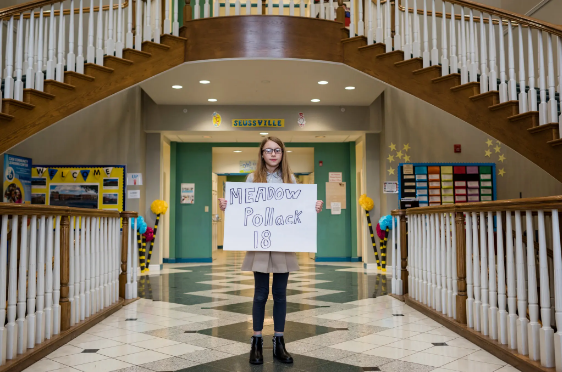
。。。达斯汀·弗朗茨为《纽约时报》撰稿
我们每天发表一篇文章来表彰第五届年度学生社论大赛的前 10 名获奖者。
When I was five, I needed someone to hold my hand as I entered school. When I was twelve, I needed someone to point to the entrance, but I could walk in alone. Now, at sixteen, I don’t need anyone — I’m a different person: independent and mature. Yet, I am treated as if I’m still a child.
After the horrific Florida shooting, students walked out of their classes in honor of the 17 lives lost. As noted in “How Young is Too Young for Protest? A National Gun Violence Protest Tests Schools,” even Utah’s Wood Cross Elementary School staged a protest in the school gym to allow the students to experience “a little civil disobedience.”
Like Wood Cross, the administration at my school staged our protest. The day before the walkout, a minute-by-minute schedule and list of guidelines — including the only two doors we could exit from — were uploaded onto Facebook. The next day, our obedient student body shuffled into the fenced area between our school buildings only to witness teachers’ comments about how “cute” we were and their apologies for being 60 seconds behind schedule. By 10:05, the end of the designated “shouting time,” my friends and I lowered our posters in defeat.
Although I am thankful that my school supports the walkout, nobody needed to be hand-held through this protest. Protesting is fighting and risking consequences, risking falling. Protesting is true civil disobedience. Yet Henry David Thoreau is rolling in his grave thinking about our “protest.” In “Civil Disobedience,” Thoreau does not “lend [himself] to the wrong which [he condemns].” Instead, he fights against it, because he has the right “to do at any time what [he thinks is] right.” We have the same right. Why prevent us from using it?
Maybe the elementary schoolers play along, but I cannot. We already have mock organizations: mock trial, model U.N., and now this walkout. The school coddles us. Highlighted in a New York Times article, the students who excelled after high school were the ones who fell and got up afterward. But if schools are going to cushion each one of our falls, how will we grow up?
I understand schools’ concern: safety first. Parents may be uncomfortable with their children protesting. But the goal of civil disobedience is to make others uncomfortable. Discomfort brings change. Change from our parents’ generation to ours.
We need adults to accept the discomfort of us taking the reins of the gun violence movement and us growing up. Otherwise, if fearful adults keep holding us back, how can we grow up to become fearless leaders?
Works Cited
Saul, Stephanie, and Anemona Hartocollis. “How Young Is Too Young for Protest? A National Gun-Violence Walkout Tests Schools.” The New York Times, 13 March 2018.
Thoreau, Henry David, 1817-1862. Civil Disobedience: Complete Texts With Introduction, Historical Contexts, Critical Essays. Boston: Houghton Mifflin, 2000. Print.
Tough, Paul. “What If the Secret to Success Is Failure?” The New York Times, 14 Sept. 2011.